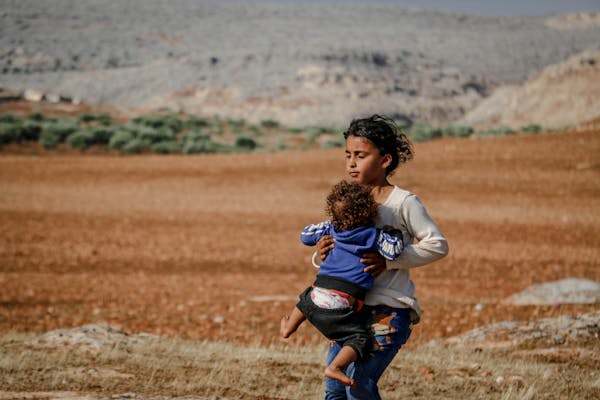It comes as the Citywest facility was closed to new arrivals yesterday due to a lack of capacity, with new arrivals from both Ukraine and other countries potentially needing to stay overnight in Dublin Airport.
The paucity of housing prevented Integration Minister Roderic O'Gorman from confirming earlier today that refugees will not be forced to sleep on the streets.
On Morning Ireland on RTÉ, O'Gorman responded, "I can't rule that out."
He claimed that the government was "not in a position to guarantee an offer of housing to everyone at this time."
When it comes to housing, O'Gorman said, "We will prioritise vulnerable persons, including women and children. For those to whom we are unable to offer housing, we will collaborate with NGOs to provide some assistance to them."
"That's why we're communicating very clearly today and working with the Ukrainian embassy to inform folks that there is a significant capacity constraint, especially for the coming week. It's not that we don't have any lodging options; rather, there aren't enough of them.
Over 58,000 persons are now being housed in Ireland, according to the Department of Children, Equality, Disability, Integration, and Youth (42,000 Ukrainian, 16,000 International Protection).
The lodging system is currently under pressure, according to Foreign Affairs Minister Simon Coveney, who was speaking in Cork this afternoon.
"Given the number of accommodations we need to find, there is no doubt that we are under pressure. In other words, the State has done the equivalent of providing housing for the residents of the city of Waterford over the past six months, according to Coveney.
That is putting our country and our systems under enormous pressure and it’s really coming to a head now because we know that that those who are coming in today and tomorrow, certainly, the women and children will be accommodated in citywest but it may not be possible to accommodate some of the men.
According to Coveney, the number of Ukrainian refugees entering Ireland two months ago was roughly 750 per week; this number has since risen to 1,500 per week, together with 400 individuals from other nations looking for international protection.
Tánaiste Leo Varadkar stated that Ireland is dealing with a severe refugee issue but that it is impossible to turn people away while speaking to RTÉ in Waterford.
"We need to be honest about the fact that we can't accommodate everyone who enters the nation because our resources have run out. Varadkar assured that every effort will be made to accommodate as many people as possible.
"We're in the same boat as pretty much every other country in Europe, and it's a very difficult scenario. We must not ignore these people.
There is a capacity limit, and at this time we just aren't in a position to guarantee housing for everyone that arrives, despite the fact that Irish people's compassion knows no bounds.
He continued by saying that because Ireland is a member of the European Union, it was impossible to turn away visitors.
"Grave worries"
Groups that advocate for refugees, such as the Ukraine Civil Society Forum (UCSF), which is made up of more than 60 NGOs, have expressed grave worries about the housing shortages.
While the UCSF acknowledges the challenging circumstances the Government is now facing, "major decisions" had to be made in order to transition from emergency planning to medium/long-term planning.
Emma Lane-Spollen, the UCSF's national coordinator, stated:
The severe capacity challenges at the Citywest Transit Center, which have caused significant overcrowding and safety concerns, have finally been acknowledged by the government. There were 1,050 individuals sleeping on chairs and the floor in a building meant to accommodate 300 people yesterday, including elderly, young children, and pregnant women.
The UCSF is extremely concerned that a catastrophe, similar to the death of a newborn in an overflow centre in the Netherlands that raised concerns about the facility's environment and access to medical care, could take place here.
The current crisis, she continued, "is not going to ease up," and an increase of arrivals is not shocking.
What's troubling is that this possibility was discussed with the Senior Officials Group weeks ago by the Department of Children, Equality, Disability and Youth, and yet here we are, according to Lane-Spollen.
Despite the Department's "phenomenal job" of housing more than 58,000 migrants, Lane-Spollen claimed that there was still a need for a "strong pipeline" of medium-term housing.
It was a "very, most serious scenario," according to Nick Henderson, CEO of the Irish Refugee Council, earlier today.
According to Henderson, it "truly demonstrates a failure in the reception of refugees, both Ukrainian and persons seeking shelter here in Ireland."
Henderson and Lane-Spollen both expressed concern about the crisis response being overseen by just one Department, and the UCSF called for the Department of the Taoiseach to be in charge of the long-term response.
According to Lane-Spollen, Ireland must start sustainable planning now to provide housing for people for "at least" two years.
The UCSF calls on the government to make immediate preparations for the future while acknowledging that refugees are real persons who have experienced trauma and require security.




.png)
The opinions posted here do not belong to 🔰www.indiansdaily.com. The author is solely responsible for the opinions.
As per the IT policy of the Central Government, insults against an individual, community, religion or country, defamatory and inflammatory remarks, obscene and vulgar language are punishable offenses. Legal action will be taken for such expressions of opinion.